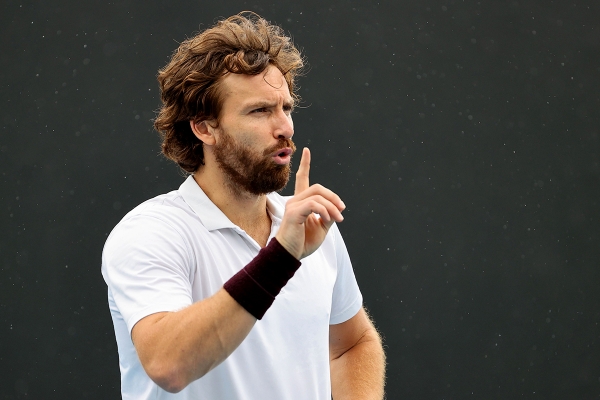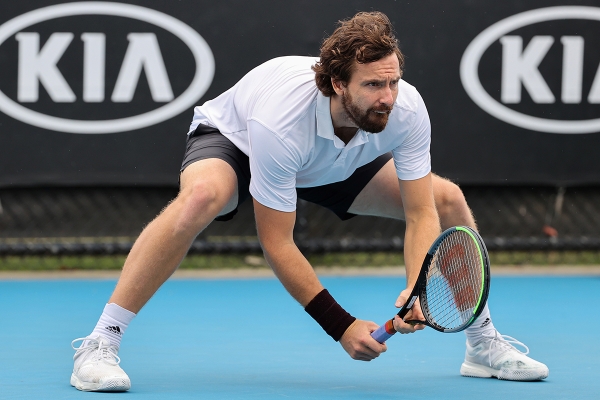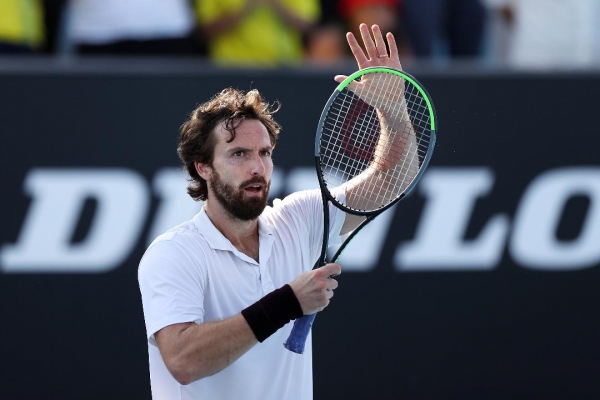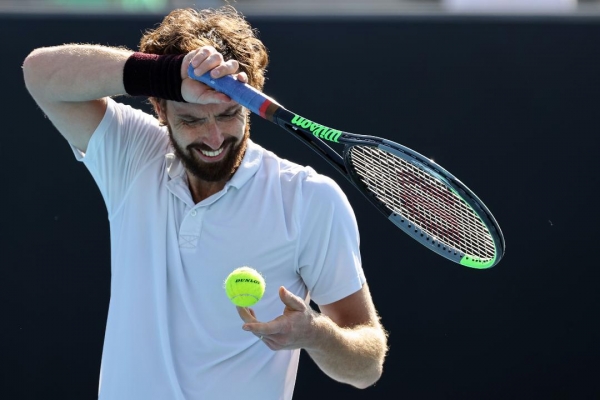After taking out No.20 seed Felix Auger-Aliassime in the first round on Tuesday, qualifier Ernests Gulbis admits he felt emotional on his walk back from 1573 Arena to the locker rooms at Melbourne Park.
It was the Latvian’s first Grand Slam main draw match win since Wimbledon 2018, and his first at the Australian Open since 2014. Ranked 256 in the world and grinding his way on the Challenger tour at age 31, the former top-10 player is acutely aware of the massive effort he has put in to get back to winning ways at the majors, and the rollercoaster ride he’s been on throughout his career.

“It’s not easy. It’s not easy to come back, it’s not easy to play Challengers, but these moments are really worth it. I’m really happy, really, truly happy that I could win today,” Gulbis told reporters after dismissing the young Canadian.
Another victory followed, this time over Aljaz Bedene of Slovenia, and it carried Gulbis into his first-ever Australian Open third round, where he takes on Frenchman Gael Monfils on Saturday.
When was the last time Gulbis felt this emotional over a win?
“Against [Alexander] Zverev in Wimbledon [2018], that was a big win. I get more emotional with age, really it’s incredible,” Gulbis replied with a grin.
“I have tears in my eyes for no reason, for a reason.
“Maybe [it’s fatherhood]. It’s strange. I like emotions. I was watching this French guy, [Constant] Lestienne I think, and he was crying on the court when he won his first round of qualies, and I started to have tears in my eyes watching him. I was so happy for him.
“I like it when things like this happen, when it pays off, I like these emotions. I also enjoy it when it happens to me, otherwise you feel like a robot.”
Gulbis can hardly ever be described as a robot. The Latvian developed a cult following ever since he emerged on tour as a teenager, breaking racquets, and bantering with the press en route to the fourth round at the 2007 US Open, and the quarterfinals at Roland Garros 2008 as a 19-year-old.
It took him six more years before he enjoyed another good run at a major; this time, he upset Roger Federer on his way to a first semifinal at the 2014 French Open. Two more Grand Slam fourth round appearances came after that (2016 Roland Garros, 2018 Wimbledon) but they were rare peaks in a fluctuating pattern that saw Gulbis drop out of the top 100 on multiple occasions, and struggle with form, injuries and confidence.
Now back in a third round for just the second time in his last nine majors, Gulbis laughs when asked about his vicious cycle of ups and downs.

“Yes, every couple of years I make some kind of run, we’ll see how big this run is going to be. Then I take a break again for a couple of years,” he says sarcastically.
Last season, Gulbis won just eight matches in total across all levels. He lost 30. He says he couldn’t translate his form from practice to the match court, and also dealt with back spasms late in the year.
He credits the five-match winning streak he is on in Melbourne (three in qualifying, two in the main draw) to a solid two months of preseason training, that included a stint in Tenerife with his coach Gunter Bresnik.
“It’s a habit a little bit. Last year I had a habit of losing, and now it’s tough to break it. You have to go through this and every ATP point now is important, just to get back to the top 100 as soon as possible and to compete at a level I want to compete at,” he explains.
“Last year it just didn’t happen, it was like banging my head against a wall, I was practicing a lot, hitting decent, then going to a tournament, tough loss here, less confidence, going to practice takes a little bit longer then … stuff like that.”
Gulbis is approaching this stage of his career with deeper perspective. He hopes to continue playing for at least five more years, but with a caveat: that he makes it out of the Challenger level and gets himself back onto the ATP tour.
“I practiced the first day I came here, with Yen-Hsun Lu, and he’s 38 and the guy is fit, he played one hour in the morning, then one and a half hour with me, I saw him the next day in the gym. It impressed me and the guy is 38. For sure I can play another five years, easy,” he says.
“It’s different. When I was younger, everything was a little bit through one ear inside and through the other ear outside. I didn’t really pay too much attention to it, I took too much for granted. So now I really know what I’m doing, really paying attention. Now when the results come it’s because of systematic work.”
Gulbis’ trials and tribulations on the Challenger tour would probably make a fun book to read one day. His life now is significantly different to when he was a top-10 player. He recalls a trip to the Orleans Challenger where he was picked up at Charles de Gaulle Airport in Paris, thinking it was your typical tournament transportation before realising he was in some sort of carpool ride.
“They picked me up, we made a 1.5-hour trip from Charles de Gaulle airport to Orly, and then we picked up like seven other people, in a van, and not tennis players, just like people who ordered this, like a taxi,” he remembers. “If had known this, I would have taken the train or a car or something. And then back to Orleans another two hours. These things. It’s like, okay, you do it, but when I was 18 I could do it with more fun, I think. Now, my family is home, I could spend time with my kids, but now I’m driving in Orleans in a van that is completely full, four hours in traffic.”
No one in the van recognised him, and the woman sat next to him was particularly annoyed to be crammed in a small seat next to a 190cm man.
Gulbis is very much aware that he is responsible for his own career, and hopes to turn things around soon.
With no shoe or clothing sponsor at the moment, he is shopping for his own clothes, and there was a brief moment of panic when he couldn’t find his shoe size at any of the stores he contacted in Melbourne upon his arrival. One of the two pairs he traveled with here broke, and he spent some time with reporters guessing which other player shares his same shoe size and could loan him a shoe.
“I’m not sure who is 46 adidas. Dominic [Thiem] is a smaller size, [Stefanos] Tsitsipas, I don’t know what size he is. It’s funny to even think about it,” Gulbis cracks up.
Thankfully, he has a pair to wear for his next clash with Monfils, who has known Gulbis for a long time, and leads their tour-level head-to-head 2-0.
Asked if he had a funny Gulbis story to share, Monfils said with a grin: “Yes, but I think I will keep it for me.”
Get your popcorn ready, folks; this will be a third round not to be missed.

